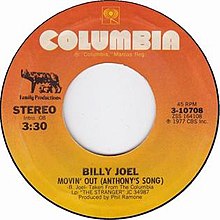
Turnstiles is the fourth studio album by American singer-songwriter Billy Joel, released May 19, 1976.

The Bridge is the tenth studio album by American singer-songwriter Billy Joel, released on July 25, 1986. It was Joel's last studio album produced by Phil Ramone as well as the last to feature Joel's long-time bassist Doug Stegmeyer and rhythm guitarist Russell Javors. The album yielded several successful singles, including "A Matter of Trust", "Modern Woman", and "This Is the Time".

The Stranger is the fifth studio album by American singer-songwriter Billy Joel, released on September 29, 1977, by Columbia Records. It was the first of Joel's albums to be produced by Phil Ramone, with whom he would work for five subsequent albums.

Songs in the Attic is the first live album by Billy Joel, released in 1981.

"Piano Man" is a song written and performed by American singer-songwriter Billy Joel. First released as a single in the US on November 2, 1973, it was included on Joel's 1973 album Piano Man. The song is sung from the point of view of a piano player at a bar, describing the patrons. "Piano Man" is based on Joel's real-life experiences as a lounge musician in Los Angeles from 1972 to 1973, which he had decided to pursue in an effort to escape his contracted New York City–based record company at the time, Family Productions, following the poor commercial performance of the album Cold Spring Harbor.

"Just the Way You Are" is a song by Billy Joel from his fifth studio album The Stranger (1977), released as the album's second single in early November 1977. It became both Joel's first US Top 10 and UK Top 20 single, as well as Joel's first Gold single in the US. The song also topped the Billboard Easy Listening Chart for the entire month of January 1978.

"You're Only Human (Second Wind)" is a song written and performed by Billy Joel that originally appeared on Greatest Hits – Volume I & Volume II in 1985. The song deals with teenage depression and suicide. It became a top-ten hit, peaking at No. 9 on the Billboard Hot 100.
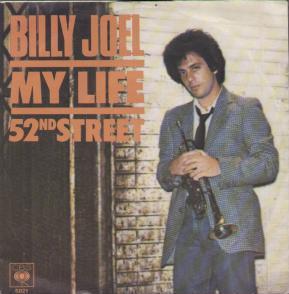
"My Life" is a song by Billy Joel that first appeared on his 1978 album 52nd Street. A single version was released in the fall of 1978 and reached No. 2 on the U.S. adult contemporary chart. Early the next year, it peaked at No. 3 on the Billboard Hot 100.
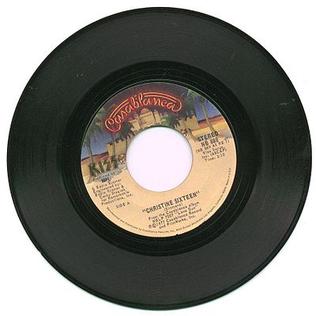
"Christine Sixteen" is a song by American hard rock band Kiss. It originally appeared on their 1977 album Love Gun. Released as a single in the US in 1977, the song peaked at number 25 on the Billboard Hot 100 chart that year, and did well in Canada, peaking at number 22.

"The Stranger" is a song by rock artist Billy Joel and the title track from his 1977 album of the same name. The song was released as a single in Japan where it became very popular and peaked at #2 on the Oricon chart, selling more than 471,000 copies, charting as well in Australia, New Zealand and France. It was the last single from the album in Japan, while the US and UK saw "She's Always a Woman", released the previous year, as the last single from the album. The single is featured on Joel's greatest hits album, Greatest Hits - Volume I & II.

"Baby, What a Big Surprise" is a ballad written by Chicago's then bassist/singer Peter Cetera, which appeared on their album Chicago XI (1977), with Cetera singing lead vocals. The first single released from the album reached number 4 on the US Billboard Hot 100 chart.
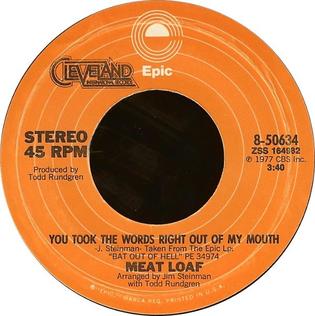
"You Took the Words Right Out of My Mouth" (also known as "You Took the Words Right Out of My Mouth (Hot Summer Night)") is the first solo single by the American singer Meat Loaf, released in 1977. It is a track from his album Bat Out of Hell, written by Jim Steinman.
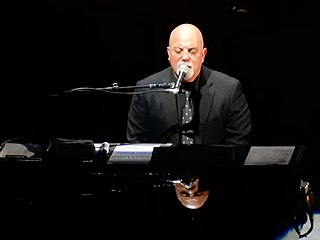
This is the discography of American singer-songwriter Billy Joel. He has released 13 studio albums, seven live albums, 18 compilation albums, 10 video albums, 82 singles, three promotional singles and 45 music videos. Throughout his career, he has sold over 150 million records worldwide, making him one of the best-selling music artists in history. According to Recording Industry Association of America, Joel has sold 85 million certified albums in the United States, making him the 4th best-selling solo artist of all time. Billboard ranked him as the 9th Greatest male soloist of all time.

"Honesty" is a song by American singer-songwriter Billy Joel, released by Columbia Records as the third US single from his sixth studio album 52nd Street (1978) in 1979. "Honesty" was solely written by Joel, while production was handled by Phil Ramone. The song appears on the Dutch and Japanese editions of Greatest Hits Volume 2, replacing "Don't Ask Me Why" (1980).

"You May Be Right" is a song written and performed by rock singer Billy Joel, released as a single and the opening track from his 1980 album Glass Houses. The single reached No. 7 on the US charts and No. 6 in Canada. It failed to chart, however, in the UK unlike his preceding and succeeding singles "All for Leyna" and "It's Still Rock and Roll to Me". The Japanese single features "Close to the Borderline" as a B-side.

"Don't Ask Me Why" is a 1980 song by Billy Joel released as the third single from the album Glass Houses. The song spent two weeks at number one on the Adult Contemporary chart and peaked at number 19 on the Billboard Hot 100.

"(Every Time I Turn Around) Back in Love Again" is a hit song written by Len Ron Hanks and Zane Grey for R&B/funk band L.T.D. Released from their Something To Love album, it spent two weeks at number one on the R&B singles chart in the fall of 1977. It became a gold record. Jeffrey Osborne is the lead singer.

"She's Always a Woman" is a song by Billy Joel from his 1977 album, The Stranger. The single peaked at No. 17 in the U.S. in Oct. 1978, and at No. 53 in the UK in 1986, when it was released as a double A-side with "Just the Way You Are". It re-entered the UK chart in 2010, reaching No. 29.

"Modern Woman" is a song performed by Billy Joel from his album The Bridge. It was the album's lead-off single and was featured on the soundtrack to the film Ruthless People. In the film, the song removes an instrumental break present in the original. It was a Top 10 hit on Billboard Hot 100 chart in 1986.
